 Petzlover
Petzlover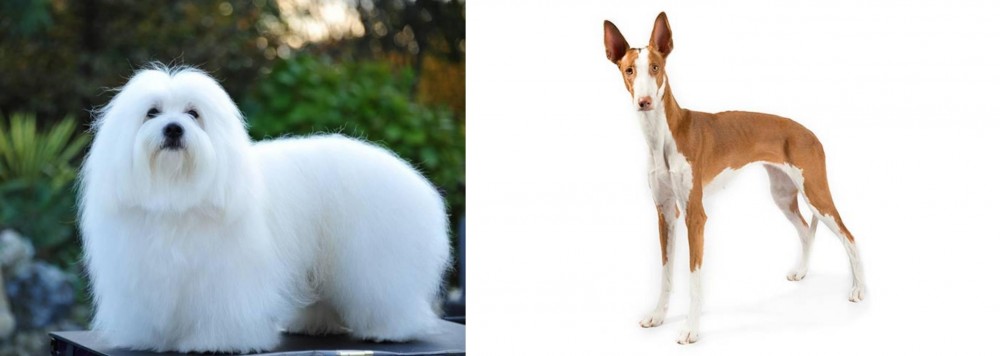 Coton De Tulear is originated from Madagascar but Ibizan Hound is originated from Spain. Coton De Tulear may grow 44 cm / 17 inches shorter than Ibizan Hound. Coton De Tulear may weigh 23 kg / 50 pounds lesser than Ibizan Hound. Coton De Tulear may live 4 years more than Ibizan Hound. Coton De Tulear may have less litter size than Ibizan Hound. Both Coton De Tulear and Ibizan Hound requires Low Maintenance.
Coton De Tulear is originated from Madagascar but Ibizan Hound is originated from Spain. Coton De Tulear may grow 44 cm / 17 inches shorter than Ibizan Hound. Coton De Tulear may weigh 23 kg / 50 pounds lesser than Ibizan Hound. Coton De Tulear may live 4 years more than Ibizan Hound. Coton De Tulear may have less litter size than Ibizan Hound. Both Coton De Tulear and Ibizan Hound requires Low Maintenance.
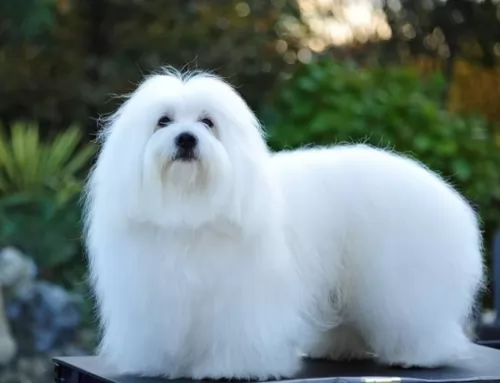 These cute little Coton de Tulear dogs originate from Madagascar and have in fact been named the ‘official dog of Madagascar’.
These cute little Coton de Tulear dogs originate from Madagascar and have in fact been named the ‘official dog of Madagascar’.
The Coton de Tulear actually takes his name from the seaport city of Tulear. In the 1970s a Frenchman brought a puppy to France, with the idea of establishing them as a breed. It was also at this time that the dogs were brought to North America.
This small fluffy white dog was also found on the island of Malta, becoming known as the Maltese. They were mated with other dogs such as the Barbet, a curly haired dog and other coat colors exist such as apricot, black and white and fawn. Other breedings led to the Barbichon family of dogs which includes the Bichon Bolognese and the Bichon Teneriffe. The modern day breeds are the Maltese and the Coton de Tulear.
As with many dog breeds, there are different tales about the origin of the dogs and one version is that the white cotton-ball type of dog survived a shipwreck off the Madagascar coast.
 This lean, speedy and agile hound dog looks and acts very much like a Pharaoh Hound except the Ibizan Hound is larger and a different color. The image of dogs that look like the Ibizan have been seen since 3400 BC in Egypt. The dogs were probably brought by sailors to Ibiza and surrounding islands. They came about 700-900 BC. It is believed that they actually came for the island of Elvissa and Spain, where they speak Catalan. It was also known in France as the le chanigue. There job was the same. To hunt rabbits.
This lean, speedy and agile hound dog looks and acts very much like a Pharaoh Hound except the Ibizan Hound is larger and a different color. The image of dogs that look like the Ibizan have been seen since 3400 BC in Egypt. The dogs were probably brought by sailors to Ibiza and surrounding islands. They came about 700-900 BC. It is believed that they actually came for the island of Elvissa and Spain, where they speak Catalan. It was also known in France as the le chanigue. There job was the same. To hunt rabbits.
They were fast hunting greyhound type dogs. They hunted for rabbit for the Ibizaners and themselves. These dogs hunt by day and by night. They are not just sight hounds, they also hunt by smell and hearing, in packs or by themselves. They use their sight to find and corner the prey. Then they act like retrievers and bring it back to the hunter. Their function and look is very similar to several other dogs such as the Pharaoh Hound, the Greyhound, the Portuguese Podengo, the Cimeco dellEtna and the Podence Canario. The Ibizan is larger than any of these, but all these breeds are considered to be “primitive”.
Within the breed itself there are smooth, wire and longhaired Ibizan Hounds. The Smooth is by far the most common. A great jumper, nimble runner built for stamina, the Ibizan Hound was just what the island people needed. The breed lived in isolation on the island for many centuries, under a variety of rulers including the Romans, Egyptians, Vandals, Carthaginians, Chaldeans, Arabs and Spanish. Because of the harsh island conditions, the farmers only allowed the best hunters among the Ibizan Hounds to procreate thus assuring a breed that is unchanged from ancient stock.
By 1950 the Ibizan Hound was brought to America. Because this dog is not a pet but a working machine, it took awhile for the breed to become popular enough to be recognized by the American Kennel Club (AKC) in 1979. Still the Ibizan Hound is a rare breed with the female being a better hunter than the male. One of the most common activities of this breed in the U.S. is lure coursing. These events are sponsored by AKC and ASFA as well as racing events in the NOTRA and LGRA.
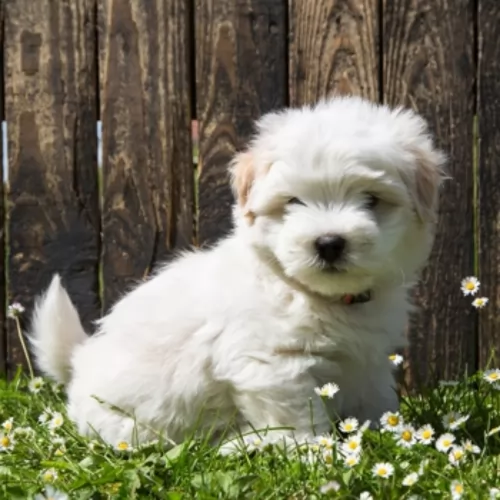 These little dogs make perfect companions. They stand about 25–30cm with the female sometimes being slightly smaller. They weigh anything between 3 – 6kg. They’re robust little canines and can live up to 19 years or so when looked after well.
These little dogs make perfect companions. They stand about 25–30cm with the female sometimes being slightly smaller. They weigh anything between 3 – 6kg. They’re robust little canines and can live up to 19 years or so when looked after well.
The Coton de Tulear is easily recognized because of his soft, fluffy coat. Many people take their dogs to the dog salon to have him washed and his hair trimmed. His legs are short and straight as well as being muscled under the hair. The ears are floppy and the tail of the Coton de Tulear is carried straight or slightly curved.
The Coton de Tulear is a friendly, affectionate dog who has a gentle, cuddly side to him. They are social dogs and get on well with their human family and with the children in the home, loving the games they provide.
He will also get on well with other pets in the home and becomes amicable, relaxed and obedient with socialization and training. Small though he is, he makes a great watchdog too and is full of tricks, making him an entertaining pet to have around.
 The breed is agile, elegant, athletic and graceful. At the same time the Ibizan Hound is a fierce hunter travelling at unreal speeds to catch his rabbit prey. They are a hardy breed with a lean and long neck, and a lean, muscled body with laid back shoulders. The ears are specific to the breed, with a broad base leading to long, beautiful ears. They have tan eye rims, nose, foot pads, and ears. The eyes themselves are an amber with an intelligent and alert expression.
The breed is agile, elegant, athletic and graceful. At the same time the Ibizan Hound is a fierce hunter travelling at unreal speeds to catch his rabbit prey. They are a hardy breed with a lean and long neck, and a lean, muscled body with laid back shoulders. The ears are specific to the breed, with a broad base leading to long, beautiful ears. They have tan eye rims, nose, foot pads, and ears. The eyes themselves are an amber with an intelligent and alert expression.
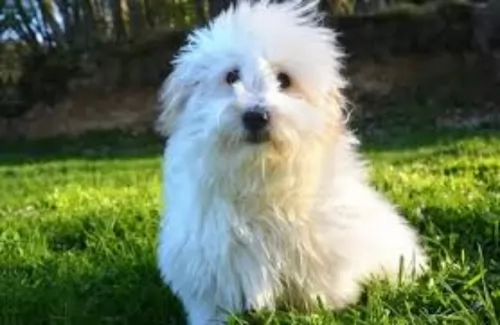 The Coton de Tulear just wants to please his human family and spend unforgettable moments with them, hating to be separated from them. He is such an adaptable little dog and will fit well into city- as well as country life.
The Coton de Tulear just wants to please his human family and spend unforgettable moments with them, hating to be separated from them. He is such an adaptable little dog and will fit well into city- as well as country life.
He is smart, comical, playful, independent and fun to have around as he is known for his clownish personality. Treat him well and he’ll repay you with plenty of love and loyalty.
 They love children but be careful they do not knock them over and don’t let the children play to rough.
They love children but be careful they do not knock them over and don’t let the children play to rough.
Exceptional jumping ability, speed and stamina.
Must have a large fenced yard and a place to run full out.
Very intelligent with excellent learning ability.
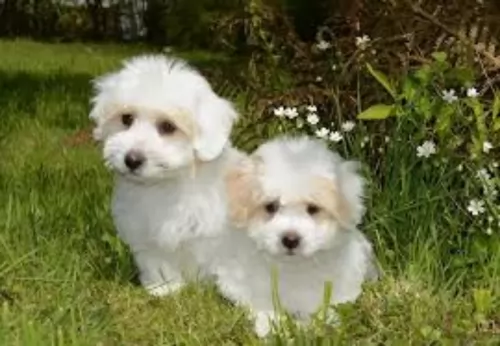 With proper care, your Coton can reach a ripe old age of 15 – 20 years of age. However, even this robust little dog will need to be watched, as he can fell prey to some common dog ailments -
With proper care, your Coton can reach a ripe old age of 15 – 20 years of age. However, even this robust little dog will need to be watched, as he can fell prey to some common dog ailments -
Bad Breath with your pet can be a sign of dental decay. Dental plaque for instance, caused by bacteria, can give your pet a terrible breath. It is important to brush your pet’s teeth 2 or 3x a week. Your vet can provide tips on how to brush your pet’s teeth with a special canine toothbrush and toothpaste.
Other things to look out for are hip dysplasia and chronic allergies. Allergies can cause itchy and dry skin as well as ear infections because of so much hair being in the ear canal. Speak to your vet about how to clean your pet's ears to avoid ear infection.
 Despite being isolated on the islands for all those years, the Ibizan Hound has several tendencies toward medical issues:
Despite being isolated on the islands for all those years, the Ibizan Hound has several tendencies toward medical issues:
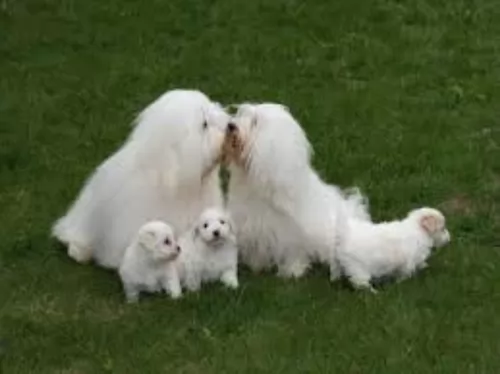 Coton de Tulears will need some exercise if you want him to remain lean and fit. It is important to provide exercise and games for your dog to prevent boredom. Activity levels for any dog, including the Coton, will depend on his age and health.
Coton de Tulears will need some exercise if you want him to remain lean and fit. It is important to provide exercise and games for your dog to prevent boredom. Activity levels for any dog, including the Coton, will depend on his age and health.
A walk every day and some ball games will keep your pet happy and prevent him from resorting to destructive behavior from sheer boredom and frustration.
The long coat will require some careful grooming and you will need to be on the lookout for excess hair around the paws and in the ears.
He is not a great shedder and brushing twice a week will remove loose hairs and provides the perfect opportunity to check for fleas and ticks.
Just like any other dog, your Coton de Tulear will need a warm, dry place to sleep. If you haven’t already invested in a doggy basket or dog bed, you can use a cardboard box for now, before making up your mind what you want for your pet.
A well behaved, obedient dog is a pleasure for everyone, and training and socialization is important, even for a small dog. Your dog will understand simple commands such as ‘sit’, ‘down’ and ‘come’ and also know how to walk well on a leash.
 Your Ibizan Hound is an athlete and needs to be fed like one. As a puppy he needs high quality breed or group (hound) specific food. Feed her 3-4 times a day based on calories. A puppy needs about 866 calories each day.
Your Ibizan Hound is an athlete and needs to be fed like one. As a puppy he needs high quality breed or group (hound) specific food. Feed her 3-4 times a day based on calories. A puppy needs about 866 calories each day.
If your dog participates in sports as adults, they need between 1450 and 2900 calories each day. The exact amount depends on how much activity the dog is engaged in. Feed at least 2 times a day.
Great speed and stamina
Your Ibizan Hound is a working athlete. He needs a lot of exercise and he needs a chance to run full out so access to land is essential. It can be a large back yard, or it can be a dog park. No matter what it is, it is essential for the Ibizan Hound. She will also require long walks at least a couple times a day. However, do not over exercise your puppy. They are great jumpers as well as runners.
The sport of lure coursing was made for the Ibizan in the same way that it was made for the Greyhound. They are good at Flyball and agility as well.